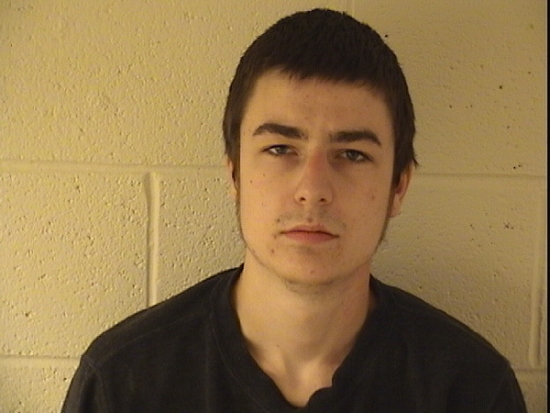 Bradley Commerford told a federal judge Friday that he sold heroin to support his own habit, and was not roaming the Valley’s streets looking for people to get hooked on the drug.
Bradley Commerford told a federal judge Friday that he sold heroin to support his own habit, and was not roaming the Valley’s streets looking for people to get hooked on the drug.
But as the judge pointed out later, Commerford didn’t stop dealing even after he knew three people had overdosed on the drugs he sold them — one of whom died. And when Commerford was picked up by police, he was on his way to get more heroin.
U.S. District Court Judge Alvin Thompson said Friday it was the 20-year-old man’s “high degree of recklessness, and no concern for others” that made up his mind to sentence Commerford to 71 months behind bars, the maximum prison term under a plea deal in the federal case.
Commerford had previously pleaded guilty to distributing heroin to a person under 21 years of age May 6 at U.S. District Court in New Haven. He was back in court Friday to find out how long he would be behind bars.
The investigation was prompted by two non-fatal overdoses in Shelton on Feb. 16 and the fatal overdose of 23-year-old Louis Ahearn on Hawthorne Avenue in Derby the next day.
The feds said Commerford was identified “as the heroin source of supply in all three overdose cases.”
Click here for more details from a previous story.
Under the terms of the plea deal, Commerford faced between 57 and 71 months behind bars at Friday’s sentencing in Hartford federal court.
’I Don’t Want To Live This Life Anymore’
Earlier in the two-hour proceeding, Commerford rose to address the judge, beginning by apologizing to his own family and Ahearn’s. It was the first time Commerford spoke in public since his arrest.
Then he told the judge that Ahearn was a close friend, and that the two had been using heroin regularly for months — something members of Ahearn’s family disputed fiercely.
“But they also have to understand that I lost my friend too, and it hurts me too that a good person gets lost behind drugs, and a terrible drug,” Commerford said.
“It’s just hard when you’re caught out in the middle of it,” he said.
Commerford said his drug use began with marijuana when he was a teenager, before he experimented with pills, then heroin.
He turned to selling the drug as a way to fund his habit, he said.
“I was just trying to get money to support my addiction, that’s the God’s honest truth,” Commerford said. “I wasn’t trying to get rich off of selling a couple bags of dope.”
Of course selling heroin was wrong, he said, “but you don’t think about that when you’re selling drugs.”
He said being locked up — and sober, for the first time since his early teens — for the past six months has taught him that he “wants to be a good citizen that people would want to associate with.”
“I don’t want to live this life anymore,” he said.
Victim’s Family: ‘Merely A Drug Dealer’
Commerford’s remarks didn’t sit well with Ahearn’s friends and family.
Commerford is not a victim, they pointed out.
Ahearn’s brother, David, told the judge that his brother wasn’t close with Commerford. He himself had known Commerford growing up, David told the judge, but distanced himself in high school when he saw Commerford had started smoking marijuana.
He said he and his brother saw Commerford as “merely a drug dealer, not much more than that.”
He recalled driving home from college to see his brother’s dead body, crying as he recalled whispering a last goodbye into Louis’ ear.
Then he spoke directly to Commerford.
“I know in my heart that you didn’t want to kill Louis,” he said. “I just know that what you did did kill him.”
Ahearn’s college roommate, Greg Goldsmith, also said he had never heard Ahearn mention Commerford’s name.
He noted the statements from Commerford and his lawyer that he has been clean and sober for the first time in nearly a decade because he was locked up.
“Maybe that is what needs to happen,” Goldsmith said, asking the judge to impose the full sentence.
Ahearn’s mother, Gina Mattei, said that Commerford is still alive, even if imprisoned.
Her son isn’t so lucky — and others wouldn’t be either if Commerford hadn’t been arrested when he was.
“If Brad wasn’t picked up when he was, how many other people would have died?” she wondered.
 Fool Us Once …
Fool Us Once …
After taking a 20-minute recess to look over his notes, Judge Thompson agreed with Ahearn’s mother.
He said it’s commendable Commerford has gotten clean behind bars and is seeking treatment.
But he noted that Commerford was arrested and charged in state court in 2014 with selling drugs. He eventually went into treatment for several months, after which he was given a suspended sentence. He went right back to selling drugs to the Valley’s youth.
About six weeks later, Ahearn died.
While the judge noted Commerford didn’t plead guilty to the specific act of selling Ahearn the fatal drugs, he had to take it into consideration.
Another thing the judge took into consideration — Commerford didn’t stop selling heroin, even after Ahearn’s fatal overdose.
“I think that tells us a lot about the defendant,” Judge Thompson said. “And I think that it reflected very poorly on him.”
“The circumstances of the defendant’s offense are egregious, and the sentence should reflect that,” the judge said.
He then sentenced Commerford to 71 months, or nearly six years, behind bars, and ordered him to undergo drug and mental health treatment.
When he gets out of prison, Commerford will be on federal probation for six years, during which he must continue treatment, stay off drugs, and do 150 hours of community service.